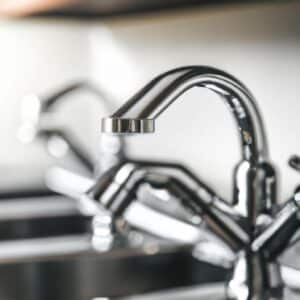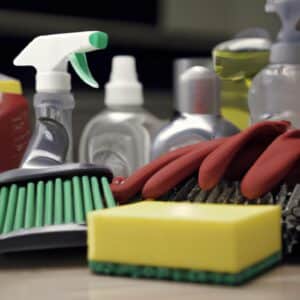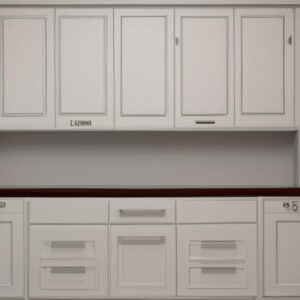Deep cleaning commercial kitchen may seem daunting, but it doesn’t have to be. With the right tools and knowledge, you can ensure your commercial kitchen is spick and span. Not only will this benefit your food safety and prevent cross-contamination, but it will also help you to save time and money in the long run.
In this article, we’ll look at the benefits of having a clean kitchen, the various methods of deep cleaning, and how to use cleaning checklists to stay on top of your cleaning schedule. So, if you own or manage a commercial kitchen, read on and get ready to take back control of your cleaning needs!
Cleaning Deep Fryers
Deep cleaning deep fryers is a must for any commercial kitchen. It’s essential to keep the fryers free of build-up and dangerous chemicals. Without proper care, deep fryers can quickly become a health hazard. To get started, you’ll need the suitable materials and cleaning methods.
First, prepare the fryers by wiping them down with a damp cloth. Then, use a baking soda paste to remove any build-up. Next, use a degreaser to remove any remaining grease. Finally, use a detergent to sanitize the fryer. Make sure to rinse off any cleaning solutions to prevent any chemical residue.
To keep deep fryers clean, it’s essential to clean them regularly. Use a degreaser to remove any grease build-up after each use. Look for any discoloration or residue build-up, and clean it as soon as possible. Also, always ensure the temperature is set correctly and the fryer works appropriately. These steps will help ensure your fryers are in top shape and ready for use.
Cleaning Grease Traps
Keeping your commercial kitchen clean means having to clean grease traps as well. Grease traps are the areas in the kitchen where fats, oils, and grease accumulate. It is essential to clean them regularly as they can lead to nasty odors and possible food contamination. The process of cleaning grease traps includes the following:
- Removing the grease from the trap.
- Draining the contents.
- Disposing of the grease properly.
You must use suitable materials to ensure your kitchen stays clean and safe.
Use protective gear such as gloves and safety glasses when cleaning grease traps. It is also vital to use non-caustic cleaning products, as harsh chemicals can cause damage to the grease trap and surrounding surfaces. Additionally, it is crucial to remove the trap’s contents and dispose of them properly. This can help prevent the spread of contamination and help maintain a safe and clean kitchen.
Cleaning Commercial Kitchens
Keeping a commercial kitchen clean prevents cross-contamination and ensures food safety. Cleaning the kitchen surfaces, appliances, and floors is crucial to deep cleaning a commercial kitchen. Gathering all the necessary materials, including sponges, paper towels, an all-purpose cleaner, gloves, and a mop, is essential. Ensuring that the kitchen staff has the proper safety precautions, such as wearing gloves and face masks, is also essential.
When cleaning the kitchen floors, the best way to ensure a thorough cleaning is to sweep and mop with a disinfectant solution. It is also important to immediately clean any spills or crumbs as they can attract bacteria. For deep cleaning, reaching all sides and corners and any cracks and crevices is crucial.
Finally, it is essential to properly clean all food items that are stored in the kitchen. Following the manufacturer’s instructions for cleaning and sanitizing is essential to do this. Make sure to wipe down all surfaces and properly dispose of any food past its expiration date. It is also essential to store food items properly, as this can help prevent cross-contamination.
You can watch the actual commercial kitchen cleaning:
Cleaning Checklists
A cleaning checklist is essential to ensure a clean and safe commercial kitchen. A checklist helps you keep track of all the tasks that need to be done and when they need to be done. Cleaning checklists can include weekly, monthly, and regular cleaning tasks. You can easily keep your commercial kitchen clean and prevent cross-contamination with the proper checklists.
Weekly checklists should include the following:
- Cleaning and sanitizing food-contact surfaces.
- Cleaning walls and ceilings.
- Cleaning floor drains.
- Scrubbing floors.
Monthly checklists should include cleaning and sanitizing kitchen equipment, checking grease traps, and scrubbing walls and ceilings. Regular cleaning checklists should include cleaning and sanitizing deep fryers, cleaning kitchen exhaust vents, and changing air filters.
Using cleaning checklists can help you stay organized and efficient. They can also help you keep track of the tasks that need to be done, save time, and ensure that all surfaces are adequately cleaned and sanitized. You can easily keep your commercial kitchen clean and prevent cross-contamination with the proper checklists.
Cleaning Tips
Cleaning your commercial kitchen regularly is essential for food safety and preventing cross-contamination. To help you stay on top of your deep cleaning routine, here are some tips for keeping your kitchen clean and staff safe:
- Ensure kitchen staff knows proper cleaning procedures and preventative safety measures.
- Use high-quality products to clean surfaces and equipment, such as deep fryers and grease traps.
- Make sure to disinfect and sanitize all food items before use.
- Use degreasing agents and scrubbing pads to remove grease from surfaces and equipment.
- Use a mop and hot water to clean kitchen floors, and change the water often.
- Clean kitchen tools and utensils regularly and store them properly.
- Have a checklist for weekly, monthly, and regular basis cleaning.
- Cleaning the kitchen regularly will help prevent cross-contamination and ensure the safety of your staff and customers.
- Use a vacuum cleaner to remove food particles and debris from the kitchen floor.
- Don’t forget to empty the garbage and wash the bins and containers regularly.
- Have a dedicated team to clean the kitchen and ensure they follow the safety guidelines.
Following these cleaning tips will help you to keep your commercial kitchen clean and safe for everyone. With regular and thorough cleaning, you can ensure that all food items and equipment are properly sanitized to prevent cross-contamination and food-borne illnesses.
Conclusion
Deep cleaning a commercial kitchen has many benefits. It ensures food safety and prevents cross-contamination, keeps your kitchen staff safe, and avoids grease build-up. A detailed cleaning checklist is vital to staying on top of the deep cleaning process. You can ensure your commercial kitchen is always in top shape with suitable materials, cleaning techniques, and checklists.
Following the processes outlined in this guide ensures your commercial kitchen is clean and safe. Whether cleaning deep fryers, grease traps, food items, or kitchen floors, you can use the steps outlined here to keep your kitchen clean and cross-contamination free.
For best results, stick to a regular cleaning routine and use the checklists provided to keep your kitchen in top condition.





